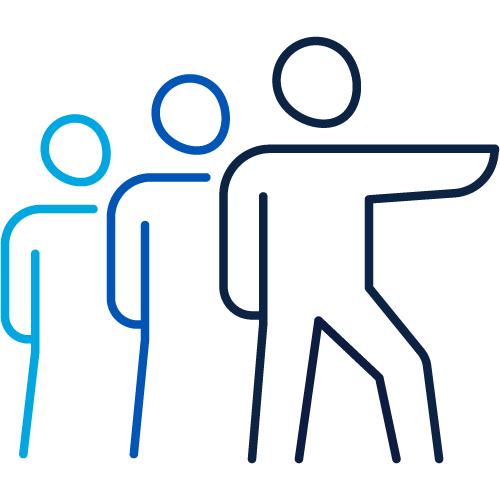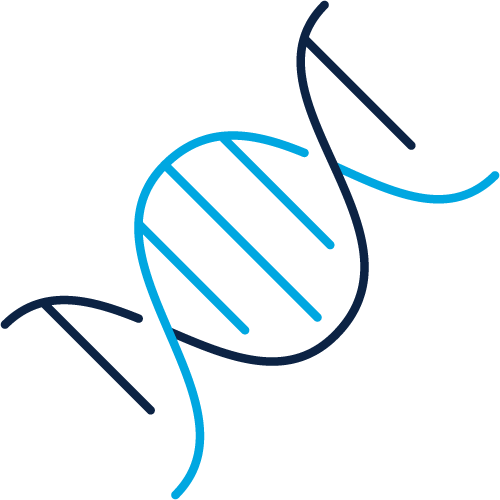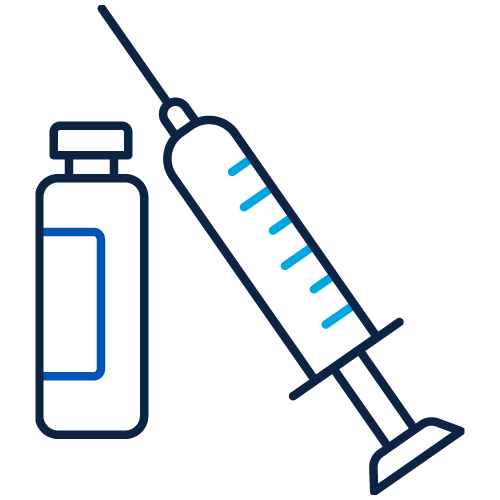Beyond 75: Imagining the future of medicine at UBC
Highlights across 75 years at UBC Medicine

In celebration of the UBC Faculty of Medicine’s 75th anniversary, we take a look back at some of the key milestones along this journey and just a few of the incredible contributions our people have made toward transforming health across B.C., Canada and around the world.
Download the printable PDF version of the timeline (1.2MB)
or the PDF version of the timeline banner (3.2MB).
1950
The UBC Faculty of Medicine welcomes its first class of 60 medical students
1950
Myron Weaver becomes first dean
1955
World-first approach to cervical cancer screening reduces incidence and mortality in B.C. by 70 per cent
1956
John “Jack” McCreary becomes second dean
1959
Jack McCreary becomes third dean
1961
Discovery of the hormone calcitonin shapes treatment of osteoporosis and other bone diseases

1961
Faculty of Medicine begins training occupational and physical therapists. Health professions later expand to include audiology and speech-language pathology (1969), laboratory science (1981), genetic counselling (1996) and midwifery (2002)
1972
David Bates becomes fourth dean
1972
First-year MD class expands to 80 medical students
1977
Pulmonary Research Laboratory, now the Centre for Heart Lung Innovation, established to improve cardiovascular and respiratory health

1977
William “Bill” Webber becomes fifth dean
1979
Opening of BC Cancer Research Institute to advance transformational cancer discoveries, technologies and treatments
1980
First-year MD class expands to 120 medical students
1981
UBC scientists develop innovative, gold-standard technique to separate cancerous cells from normal stem cells, providing new understanding of bone marrow transplantation treatments for leukemia and breast cancer
1981
Researchers at UBC’s Neurodegenerative Disorders Centre transform understanding and treatment of Parkinson’s disease, MS, ALS and more

1984
UBC research leads to development of liposome-encapsulated drugs, such as Abelcet, for the treatment of fungal infections
1985
UBC researchers show that aspirin is effective for patients with unstable angina, helping millions with the heart condition worldwide
1988
First-in-Canada screening mammography approach improves breast cancer outcomes

1990
Martin Hollenberg becomes sixth dean
1990
Centre for Health Services and Policy Research established to foster health system performance, equity and sustainability
1990
UBC Medical Student & Alumni Centre (MSAC) opens in Vancouver. MSAC spaces later open in Victoria (2015) and Prince George (2017).
1991
UBC discovery leads to development of drug vernakalant to treat abnormal heart rhythms associated with heart disease and high blood pressure

1993
Dr. Michael Smith wins Nobel Prize in Chemistry for site-directed mutagenesis
1993
Founding of W. Maurice Young Centre for Applied Ethics to advance research and teaching of applied ethics
1993
Centre for Molecular Medicine and Therapeutics established to study genetic basis of disease and translate research into new treatments
1994
Province-wide distribution of residency programs begins. Today, more than 1,440 resident doctors are training in communities across B.C. in specialities such as family medicine, psychiatry, emergency medicine and more

1995
Opening of ICORD (International Collaboration on Repair Discoveries) research centre to promote prevention, recovery and quality of life after spinal cord injury

1995
BC Children’s Hospital Research Institute established to improve the health of children and families
1996
John Cairns becomes seventh dean
1996
UBC researchers help shape Treatment as Prevention (TasP) strategy to control the HIV/AIDS epidemic, which goes on to be adopted by jurisdictions worldwide
1998
Discovery of genetic alteration linked to childhood and adult cancers leads to lifesaving new treatment

1998
Vancouver Prostate Centre founded to improve the longevity and quality of life of patients
1998
Centre for Advancing Health Outcomes established to evaluate the effectiveness of health interventions and transform health systems
1999
Canada’s Michael Smith Genome Sciences Centre opens, becoming a global leader in genomics, proteomics, bioinformatics and precision medicine
1999
Researchers discover major gene underlying “good” cholesterol
1999
Founding of Human Early Learning Partnership to improve early childhood development
2001
First-year MD class expands to 128 medical students

2002
UBC launches the Indigenous MD Admissions Pathway to inspire more Indigenous students to pursue a career in medicine. To date, 139 Indigenous doctors have graduated from UBC. In the same year, the Faculty launched the Indigenous Family Medicine Residency Program, where resident doctors train and enhance the delivery of culturally safe care in Indigenous communities around the province.
2002
Centre for Blood Research established to conduct innovative research into blood and blood-related diseases
2003
Gavin Stuart becomes eighth dean
2003
2003
UBC researchers are first to sequence the SARS virus genome and lead international efforts to develop a vaccine

2004
UBC launches Canada’s first distributed medical education program. Today, UBC medical students train at four geographically distinct sites in Vancouver-Fraser, the North, the Interior and on Vancouver Island.

2004
Founding of Centre for Hip Health and Mobility to improve the lives of an aging population and people living with disabilities
2005
UBC researchers pioneer minimally invasive way to replace heart valves without open-heart surgery
2005
Opening of the Life Sciences Institute at UBC Vancouver, the largest centre of its kind in Canada
2005
Women’s Health Research Institute established, expanding research aimed at improving the health and lives of women and girls
2005
Formation of Providence Health Care Research Institute
2006
UBC Institute of Mental Health established to improve the diagnosis and treatment of mental illnesses across the lifespan

2007
First-year MD class expands to 256 medical students
2007
Researchers discover how to boost innate immune response to fight infection, superbug bacteria
2008
UBC researchers shape precision cancer treatments by advancing personalized cancer genome sequencing, and discovering that ovarian cancer is made up of multiple subtypes

2008
Founding of Centre for Health Education Scholarship to enhance health education locally, nationally and globally
2009
Early-life experiences shown to “get under the skin” to influence risk of chronic diseases
2010
Innovative ovarian cancer prevention strategy known as opportunistic salpingectomy developed by UBC researchers

2010
Researchers discover a new gene alteration linked to frontotemporal dementia
2012
Approval of world’s first gene therapy, developed by UBC researchers to treat lipoprotein lipase deficiency
2014
Opening of the Djavad Mowafaghian Centre for Brain Health, Canada’s largest integrated brain centre for research and patient care

2014
UBC Centre for Excellence in Indigenous Health created to advance the health of Indigenous Peoples
2015
Dermot Kelleher becomes ninth dean
2016
Launch of BC Centre on Substance Use to advance research, education and clinical guidance related to substance use and addiction

2017
Two doses of HPV vaccine shown to provide long-lasting protection, shaping global health policy

2017
Launch of Centre for Chronic Disease Prevention and Management at UBC Okanagan
2018
UBC research enables first siRNA drug to receive FDA approval, treating a previously fatal hereditary condition
2018
$24-million gift establishes Edwin S.H. Leong Centre for Healthy Aging, advancing research to help people live longer, healthier and happier lives

2020
UBC begins to expand and distribute health professions programs. Today, students in physical therapy, occupational therapy, midwifery and speech language pathology train in communities across B.C.
2020
Faculty of Medicine community leads global COVID-19 pandemic response and makes critical contributions to development of mRNA vaccines
2020
Centre for Cardiovascular Innovation founded to improve the health of patients with cardiovascular disease
2021
In a major advancement for treating type 1 diabetes, UBC researchers are first to show that a stem-cell based implant can produce insulin in the human body

2021
UBC Planetary Healthcare Lab established to reduce environmental footprint of healthcare

2021
Formation of UBC Academy of Translational Medicine to accelerate scientific discoveries from bench to bedside
2021
UBC Medicine issues formal apology and Response to the Truth and Reconciliation Commission of Canada’s Calls to Action
2021
Drone Transport Initiative launched to bring medical supplies to rural, remote and Indigenous communities
2022
UBC launches the new Black Student MD Admissions Pathway to inspire more Black students to study medicine

2022
UBC researchers develop world’s fastest AI-powered drug screening technology

2022
UBC launches the MS Research Network to advance innovations in treatment and care — thanks to the world’s largest known gift for MS research
2022
Northern Centre for Clinical Research established to improve health care for northern and Indigenous communities
2023
UBC’s family medicine residency program is the largest in Canada with 20 training sites across B.C., including in rural, remote and Indigenous communities

2023
Road to Recovery initiative, co-developed by UBC researchers, supports seamless and evidence-based addiction care in B.C.
2024
Canada’s Immuno-Engineering and Biomanufacturing Hub receives nearly $200 million to bolster readiness for future health threats

2024
UBC researchers launch world’s first epitope-based matching program for kidney transplants in B.C.
2024
Faculty of Medicine welcomes the largest MD class in its history, with 328 first-year medical students
2025
School of Biomedical Engineering, first established in 2017, opens state-of-the-art new facility to foster interdisciplinary training, research and collaboration with industry
Dreamers, Skeptics and Healers
For more on the UBC Faculty of Medicine’s incredible history, explore Dreamers, Skeptics and Healers: The Story of BC’s Medical School. This beautifully illustrated book is an inspiring reflection on the Faculty’s rise from humble beginnings to its standing today as a beacon of excellence globally.